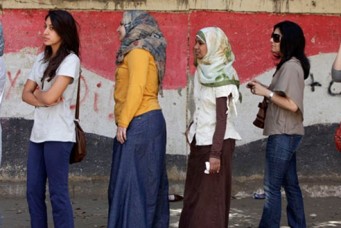How Egypt’s Islamists Lost the First Round

Campaign posters for Islamist presidential candidate Mohammed Morsi, Cairo, May 24, 2012. Scott MacLeod for the Cairo Review.
Let’s do the math.
According to the preliminary results of Egypt’s presidential poll, the Muslim Brotherhood’s Freedom and Justice Party (FJP) candidate Mohammed Morsi picked up 5,578,760 votes, around 25 percent, followed by Mubarak-era minister and PM Ahmed Shafik with 5,333,84, 24 percent. In a surprise showing, Nasserist Hamdeen Sabahi was next with 4,670,939 votes, 21 percent. Trailing were two former leading candidates, ex-Muslim Brotherhood leader Abdel Moneim Aboul Fotouh with 3,919,727, 18 percent, and in a distant fifth place, former Arab League secretary general and Mubarak-era Foreign Minister Amr Moussa at 2,391,214, or 11 percent.
If we divide the top five candidates into Islamists and non-Islamists, the simple calculation reveals that Islamists Morsi and Aboul Fotouh secured 43 percent of the vote, a mammoth 13 percent less than the total percentage of votes gained by the three non-Islamist candidates, who combined, received around 56 percent of the vote.
Compare that to the Islamist victory in the parliamentary election recorded in January. The FJP-dominated Democratic Alliance alone picked up around 47 percent of People’s Assembly seats in a poll where voter turnout was around 54 percent, at least 10 percent higher than in the presidential election.
In terms of the number of votes, while the FJP raked in some 13 million votes in the parliamentary election, that number crashed down to 5.5 million in the presidential race. Even if we add Aboul Fotouh’s votes to the mix, the number still barely reaches 9.4 million votes, down by a staggering 3.6 million from those who voted Islamist less than six months ago.
Despite their massive organizational machine, Morsi struggled to make it to the runoff, betraying rising disillusionment with the FJP and the Islamist discourse in general.
The 56 percent who voted non-Islamist had one common denominator: their absolute resolve not to see the FJP candidate in the presidential office. This was a manifestation of their unequivocal objection to the fact that the FJP seeks to dominate the political arena, with a significant block in parliament and possibly a leading voice in the controversial constituent assembly tasked with writing the new constitution.
While it’s understandable that voters, disillusioned and fearful of Islamist hegemony, would choose to support another icon of the revolution like Hamdeen Sabahi, the reason why the runoff will most likely end up between the two polar extremes Morsi and Shafiq, is that Egyptians have proven that they are still trapped in the anti-Islamist rhetoric of the Mubarak era. These results have taken us back to square one when many may find themselves forced to plug their ears and noses to give their protest vote to the FJP, just like the old days.
The fear of Islamists is so deeply entrenched in the Egyptian psyche that it has obliterated the memory of the revolution’s martyrs. In a way, the shocking support for Shafik betrays a level of ethical and moral bankruptcy that surpasses mere political illiteracy. Shafik’s rise from the ashes of the martyrs was only made possible with the backing of the disbanded National Democratic Party whose patronage system is alive and well. His veiled threat to clamp down on both the Islamists and the revolutionaries was the war cry for the counter-revolutionaries, headed by the Supreme Council of the Armed Forces, which has been preparing for this moment since February 12, 2011.
Some so-called liberal intellectuals and politicians, with their phobic attitude towards the Islamists, also helped create the vacuum filled by Shafik. Their fear of an illusive theocracy, which they consistently pitted against the equally illusive notion of a “civil state,” has overlooked the biggest threat of all to the rise of democracy in this country: military rule.
Egypt’s Islamists, the FJP in particular, have made grave mistakes. Their abysmal performance at the polls and in parliament, which proves beyond a doubt how their street credence has plunged, must force them to make serious concessions to save the revolution from the grip of an electoral ‘naksa’ (crisis), a setback to the worst days of the Mubarak era, but alas this time supported by the legitimacy of free and fair elections.
The Islamists must reach immediate consensus with other political forces over the formation of the constituent assembly mandated to draft a new constitution, an issue of vital importance that faded from public attention during the presidential election but witnesses major conflicts in parliament. Agreement to offer Sabahi the position of prime minister with a solid executive mandate will be essential to the creation of a strong, representative pro-revolutionary front. Islamists’ failure to reach such consensus will be the last nail in their coffin. They will lose the presidency to Shafik, whose first decision will be to dissolve parliament.
And with that Egypt will have come full circle.
Rania Al Malky is a Cairo-based columnist and the former chief editor of the Daily News Egypt.


